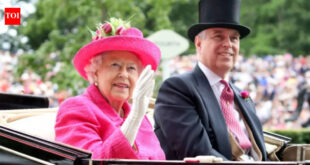The naming of Chinese businessman Yang Tengbo as a “spy” working on behalf Beijing by anti-China hawks in Britain’s ruling elite has exacerbated the crisis facing the Labour government’s geopolitical strategy.
Prime Minister Sir Keir Starmer came to power criticising the previous Conservative government’s policies on China as “inconsistent”. Labour would conduct an “audit” of UK-China relations based on a premise of “We will co-operate where we can, compete where we need to, and challenge where we must.”
The “inconsistencies” of the Tories on China were the post-2016 tearing up of the close relations established under Tory David Cameron’s premiership (2010-15) to appease the demands of the first administration of US President Donald Trump. Cameron’s “golden era” with China, with burgeoning investment in Britain’s economy and Britain signing up to the Asian Infrastructure Investment Bank (AIIB), linked to China’s global Belt and Road Initiative, was rolled back in an unsuccessful effort to secure favourable trade relations with the US post-Brexit.
With Trump winning the 2024 US election and taking office a month from now, tensions, already acute under the Biden administration, are being ramped up again. This makes any attempt at establishing a lucrative economic relationship with China by Starmer a target of the wrath of the fascist about to enter the White House, and his fellow thinkers in the British Tory Party.
Tengbo, aka Chris Yang, arrived in Britain in 2002 as a student before founding the Hampton Group International consultancy firm in 2005. In 2013, he was granted indefinite leave to remain in the UK, but in 2023 he was barred from the UK by then Conservative Home Secretary Suella Braverman. He had been detained at the border under counterterrorism laws in 2021, the reasons for which have never been made public.
The government alleged that Tengbo was using his relationship with King Charles’s brother, the Duke of York Prince Andrew, to spy for the Chinese government via the United Front Work Department (UFWD), an arm of the Chinese government. He had met in his London office with two Conservative Prime Ministers, Cameron and Theresa May, as well as Cameron’s former chancellor, George Osborne.
Tengbo appealed to the Special Immigration Appeals Commission (SIAC) in August 2023, which upheld the Home Office verdict that he had carried out “covert and deceptive activity” on behalf of the Chinese state. Judges stated this month that Braverman “was entitled to conclude that he was a ‘risk to national security’ and [his] exclusion was justified and proportionate”.
Even three years after his original detaining, Tengbo was known only as “H6” under a secrecy order. But on December 16, a few days after the SIAC ruling, High Court judge Martin Chamberlain ruled that he could be named. By this stage, screaming headlines—led by The Times and Telegraph—were fuming over how a “Chinese spy” was at the centre of an “espionage plot” with access to the Royal Family and other top figures.
MPs were threatening to name Tengbo under Parliamentary privilege, including the leader of Reform UK Nigel Farage, who has close links to Trump.
His stand weas backed by Labour MP Graham Stringer, who said it was “ludicrous” for H6 to remain anonymous “in the country he was allegedly spying on,” and the Guardian reported “growing unease about the government’s approach to China among some on the Labour benches and among trade unions. Five new Labour MPs have joined the China-sceptic group – the Inter-Parliamentary Alliance on China (IPAC).” IPAC, founded in 2020, is a substantial international grouping of cross-party parliamentarians with over 240 members from 27 legislatures and the European Parliament.
Leading Tory figures, including former party leader Sir Iain Duncan Smith—who serves as IPAC co-chair along with a Labour peer Baroness Kennedy—and other anti-China hawks including Tom Tugendhat, seized on the crisis to push their agenda. Duncan Smith demanded that China be officially declared a “threat” to the UK’s national interests, rather than its current designation as a “challenge”. He was able to secure a Commons debate on Tengbo Monday, even in the face of parliamentary convention that MPs avoid discussing the affairs of senior members of the royal family.
Duncan Smith and Tugendhat said the H6/Tengbo affair proved that China was an existential threat, with Duncan Smith stating, “H6 was, in fact, not a lone wolf. He was one of some 40,000 members of the United Front Work Department, which, as the Government know, the Intelligence and Security Committee report last year said had penetrated ‘every sector’ of the UK economy, including by spying, stealing intellectual property, influencing, and shaping our institutions.”
The Labour government was accused of dragging its feet, with its critics insisting on adding China to the “enhanced tier” of a proposed Foreign Influence Registration Scheme (FIRS). Devised by Tugendhat when the Tories were in office, this will force companies acting in certain capacities for foreign powers or entities to post that activity on a central register. Loosely modelled on the US Foreign Agents Registration Act, the intention of the Sunak government was to have FIRS in operation this autumn, a decision put off due to this summer’s snap general election.
Duncan Smith asked Security Minister Dan Jarvis, “Is it true, as is being reported by papers including The Times, that behind the scenes the Government are now under pressure from banks, the wider business community and Government Departments not to do it [implement FIRs]?”
Starmer knows full well that to impose FIRS would torpedo any further economic ties with the second largest economy in the world, under conditions in which Britain’s economy is in a mess. Inflation increased for a second month in November, with zero growth recorded for July-September, the first three months of Labour in Downing Street.
Jarvis claimed that on taking office Labour “found that FIRS was not ready to be implemented, as has been claimed.” The government would now lay “regulations in the new year with a view to the scheme going live in the summer.” Not committing to adding China to the list, he added, “Work is also under way to identify which foreign powers will be placed on the enhanced tier,” which “will be based on robust security and intelligence analysis.”
Jarvis’s response was determined by realpolitik, with senior Labour figures trying to use the brief window before Trump takes office and makes good on threats to impose huge tariffs on Chinese goods to mitigate the detrimental impact on the UK economy.
Figures published by the House of Lords Library this month pointed to the still extensive trade links between Britain and China. Citing statistics from the Department for Business and Trade, it noted, “China was the UK’s fifth largest trading partner in the four quarters to the end of Q2 2024, accounting for 5.1% of total UK trade. Total trade in goods and services (exports plus imports) between China and the UK was £87.7bn across those four quarters, made up of £32bn of UK exports to China and £55.7bn of imports from China.”
While courting Trump’s team, Labour has been desperately trying to stabilise relations with Beijing since taking office in July.
In October, Foreign Secretary David Lammy met his counterpart in Beijing with the Foreign Office describing talks as “constructive across the full breadth of the bilateral relationship, from areas of pragmatic cooperation to issues of contention”. It concluded that “maintaining channels of communication” was essential, with both countries “committed to holding regular discussions across their respective governments at Ministerial level.”
Lammy’s meeting laid the basis for a discussion on the sidelines of the G20 Summit in Rio de Janeiro between Starmer and Chinese President Xi Jinping the following month. This was the first meeting a British prime minister had held with Xi for six years, after Theresa May in 2018.
Labour is seeking to develop the UK’s relationship with China, with a major trade trip to Beijing set for the second week of January led by Chancellor Rachel Reeves. This is timed to pre-empt Trump’s inauguration on January 20. Reeves opposes placing China on the FIRS list—with her position having substantial backing within the City of London.
The Financial Times noted that Reeves “will be accompanied by City minister Tulip Siddiq and leading financial figures on the trip, which is expected to relaunch the UK-China Economic and Financial Dialogue, last held in 2019.”
Another leading figure in the Treasury, Emma Reynolds, was until May the managing director of public affairs at TheCityUK, a trade group representing banks in the City of London. Bloomberg revealed this week, “It was in that role that she [Reynolds] was part of a campaign to convince the then [Conservative] government not to impose tougher rules on those doing business with China, according to people familiar with the matter who asked not to be named discussing sensitive matters.”
In opposition, Reeves developed over several years the closest relations with big business, particularly the financial sector, convincing them that a now avowedly pro-business Labour—having routed the Corbynite “left”—was ready to do their bidding. On the bankers’ behalf, Reeves pledged further deregulation, stating last month that additional regulations put in place after the 2008 global financial crash were hampering the competitiveness of the City. “These changes have resulted in a system which sought to eliminate risk-taking. That has gone too far and, in places, it has had unintended consequences, which we must now address,” she said.
Labour has made extraordinary efforts to appease Trump since taking office and constantly stresses the UK’s “special relationship” with the US. But its China policy still puts it in the crosshairs the most ardent pro-Trump/anti-China forces in British ruling circles. A Telegraph editorial, published just prior to the naming of Tengbo, “Standing up to China,” castigated, “Labour and Conservative parties” who “have mis-read the rise of China for too long.” Beijing is “certainly a hostile power, with plans to shape the rest of the world to its own interests…”
In contrast, “Trump instinctively gets that, and is ready to mobilise the power of the West to contain its ambitions. On China the president-elect is fundamentally right. Over the coming year, the UK will have to take a side.
“We should forget about steering a middle course between Washington and Beijing, or trying to be a bridge between East and West. It is not going to work, and we will just humiliate ourselves in the process.”
Join the fight for socialism!
Fill out the form to be contacted by someone from the WSWS in your area about getting involved.
Source link


